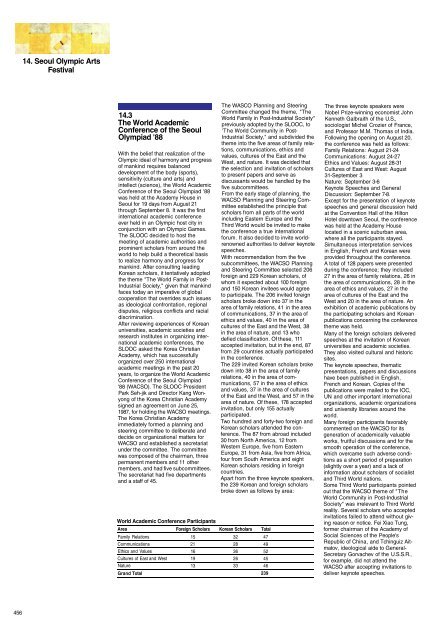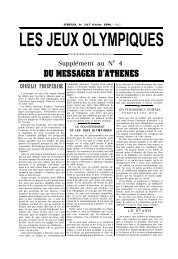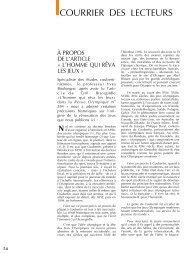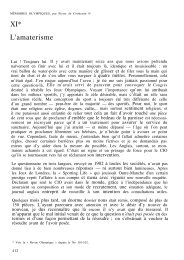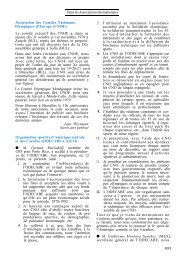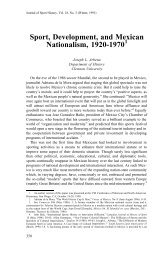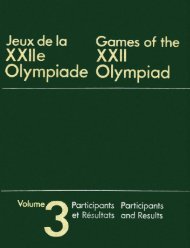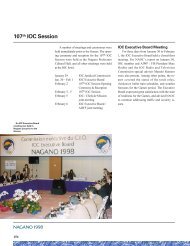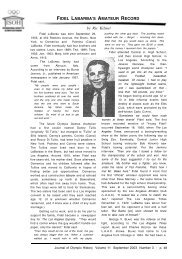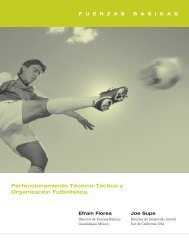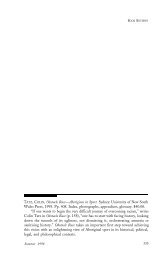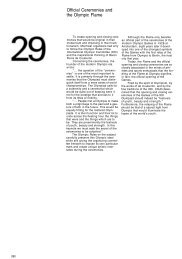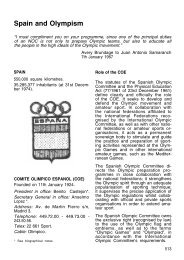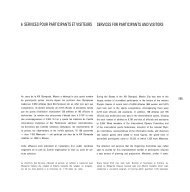Part 2 - LA84 Foundation
Part 2 - LA84 Foundation
Part 2 - LA84 Foundation
Create successful ePaper yourself
Turn your PDF publications into a flip-book with our unique Google optimized e-Paper software.
456<br />
14. Seoul Olympic Arts<br />
Festival<br />
14.3<br />
The World Academic<br />
Conference of the Seoul<br />
Olympiad '88<br />
With the belief that realization of the<br />
Olympic ideal of harmony and progress<br />
of mankind requires balanced<br />
development of the body (sports),<br />
sensitivity (culture and arts) and<br />
intellect (science), the World Academic<br />
Conference of the Seoul Olympiad '88<br />
was held at the Academy House in<br />
Seoul for 19 days from August 21<br />
through September 8. It was the first<br />
international academic conference<br />
ever held in an Olympic host city in<br />
conjunction with an Olympic Games.<br />
The SLOOC decided to host the<br />
meeting of academic authorities and<br />
prominent scholars from around the<br />
world to help build a theoretical basis<br />
to realize harmony and progress for<br />
mankind. After consulting leading<br />
Korean scholars, it tentatively adopted<br />
the theme "The World Family in Post-<br />
Industrial Society," given that mankind<br />
faces today an imperative of global<br />
cooperation that overrides such issues<br />
as ideological confrontation, regional<br />
disputes, religious conflicts and racial<br />
discrimination.<br />
After reviewing experiences of Korean<br />
universities, academic societies and<br />
research institutes in organizing international<br />
academic conferences, the<br />
SLOOC asked the Korea Christian<br />
Academy, which has successfully<br />
organized over 250 international<br />
academic meetings in the past 20<br />
years, to organize the World Academic<br />
Conference of the Seoul Olympiad<br />
'88 (WACSO). The SLOOC President<br />
Park Seh-jik and Director Kang Wonyong<br />
of the Korea Christian Academy<br />
signed an agreement on June 25,<br />
1987, for holding the WACSO meetings.<br />
The Korea Christian Academy<br />
immediately formed a planning and<br />
steering committee to deliberate and<br />
decide on organizational matters for<br />
WACSO and established a secretariat<br />
under the committee. The committee<br />
was composed of the chairman, three<br />
permanent members and 11 other<br />
members, and had five subcommittees.<br />
The secretariat had five departments<br />
and a staff of 45.<br />
World Academic Conference <strong>Part</strong>icipants<br />
Area<br />
Family Relations<br />
Communications<br />
Ethics and Values<br />
Cultures of East and West<br />
Nature<br />
Grand Total<br />
Foreign Scholars<br />
15<br />
21<br />
16<br />
19<br />
13<br />
The WASCO Planning and Steering<br />
Committee changed the theme, "The<br />
World Family in Post-Industrial Society"<br />
previously adopted by the SLOOC, to<br />
'The World Community in Post-<br />
Industrial Society," and subdivided the<br />
theme into the five areas of family relations,<br />
communications, ethics and<br />
values, cultures of the East and the<br />
West, and nature. It was decided that<br />
the selection and invitation of scholars<br />
to present papers and serve as<br />
discussants would be handled by the<br />
five subcommittees.<br />
From the early stage of planning, the<br />
WACSO Planning and Steering Committee<br />
established the principle that<br />
scholars from all parts of the world<br />
including Eastern Europe and the<br />
Third World would be invited to make<br />
the conference a true international<br />
forum. It also decided to invite worldrenowned<br />
authorities to deliver keynote<br />
speeches.<br />
With recommendation from the five<br />
subcommittees, the WACSO Planning<br />
and Steering Committee selected 206<br />
foreign and 229 Korean scholars, of<br />
whom it expected about 100 foreign<br />
and 150 Korean invitees would agree<br />
to participate. The 206 invited foreign<br />
scholars broke down into 37 in the<br />
area of family relations, 41 in the area<br />
of communications, 37 in the area of<br />
ethics and values, 40 in the area of<br />
cultures of the East and the West, 38<br />
in the area of nature, and 13 who<br />
defied classification. Of these, 111<br />
accepted invitation, but in the end, 87<br />
from 29 countries actually participated<br />
in the conference.<br />
The 229 invited Korean scholars broke<br />
down into 38 in the area of family<br />
relations, 40 in the area of communications,<br />
57 in the area of ethics<br />
and values, 37 in the area of cultures<br />
of the East and the West, and 57 in the<br />
area of nature. Of these, 178 accepted<br />
invitation, but only 155 actually<br />
participated.<br />
Two hundred and forty-two foreign and<br />
Korean scholars attended the conference.<br />
The 87 from abroad included<br />
30 from North America, 12 from<br />
Western Europe, five from Eastern<br />
Europe, 31 from Asia, five from Africa,<br />
four from South America and eight<br />
Korean scholars residing in foreign<br />
countries.<br />
Apart from the three keynote speakers,<br />
the 239 Korean and foreign scholars<br />
broke down as follows by area:<br />
Korean Scholars<br />
32<br />
28<br />
36<br />
26<br />
33<br />
Total<br />
47<br />
49<br />
52<br />
45<br />
46<br />
239<br />
The three keynote speakers were<br />
Nobel Prize-winning economist John<br />
Kenneth Galbraith of the U.S.,<br />
sociologist Michel Crozier of France,<br />
and Professor M.M. Thomas of India.<br />
Following the opening on August 20,<br />
the conference was held as follows:<br />
Family Relations: August 21-24<br />
Communications: August 24-27<br />
Ethics and Values: August 28-31<br />
Cultures of East and West: August<br />
31-September 3<br />
Nature: September 3-6<br />
Keynote Speeches and General<br />
Discussion: September 7-8.<br />
Except for the presentation of keynote<br />
speeches and general discussion held<br />
at the Convention Hall of the Hilton<br />
Hotel downtown Seoul, the conference<br />
was held at the Academy House<br />
located in a scenic suburban area,<br />
where all the participants stayed.<br />
Simultaneous interpretation services<br />
in English, French and Korean were<br />
provided throughout the conference.<br />
A total of 128 papers were presented<br />
during the conference; they included<br />
27 in the area of family relations, 26 in<br />
the area of communications, 28 in the<br />
area of ethics and values, 27 in the<br />
area of cultures of the East and the<br />
West and 20 in the area of nature. An<br />
exhibition of academic publications by<br />
the participating scholars and Korean<br />
publications concerning the conference<br />
theme was held.<br />
Many of the foreign scholars delivered<br />
speeches at the invitation of Korean<br />
universities and academic societies.<br />
They also visited cultural and historic<br />
sites.<br />
The keynote speeches, thematic<br />
presentations, papers and discussions<br />
have been published in English,<br />
French and Korean. Copies of the<br />
publications were mailed to the IOC,<br />
UN and other important international<br />
organizations, academic organizations<br />
and university libraries around the<br />
world.<br />
Many foreign participants favorably<br />
commented on the WACSO for its<br />
generation of academically valuable<br />
works, fruitful discussions and for the<br />
smooth operation of the conference,<br />
which overcame such adverse conditions<br />
as a short period of preparation<br />
(slightly over a year) and a lack of<br />
information about scholars of socialist<br />
and Third World nations.<br />
Some Third World participants pointed<br />
out that the WACSO theme of "The<br />
World Community in Post-Industrial<br />
Society" was irrelevant to Third World<br />
reality. Several scholars who accepted<br />
invitations failed to attend without giving<br />
reason or notice. Fei Xiao Tung,<br />
former chairman of the Academy of<br />
Social Sciences of the People's<br />
Republic of China, and Tchinguiz Aitmatov,<br />
ideological aide to General-<br />
Secretary Gorvachev of the U.S.S.R.,<br />
for example, did not attend the<br />
WACSO after accepting invitations to<br />
deliver keynote speeches.


